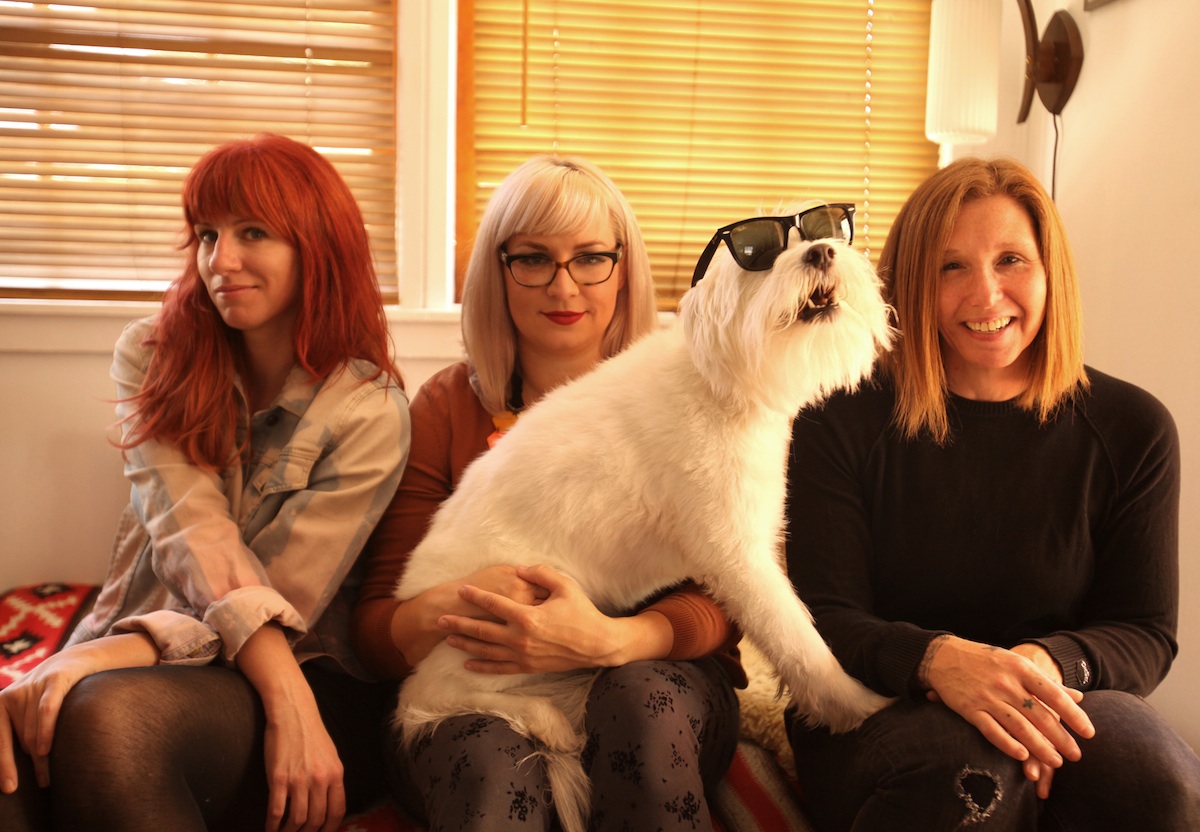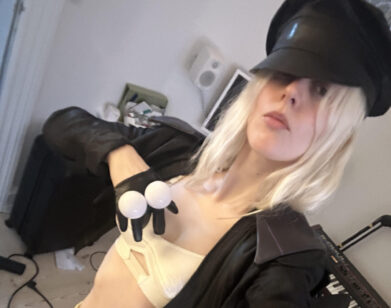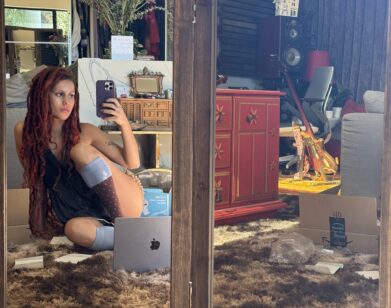Becoming Upset

ABOVE, L-R: JENNIFER PRINCE, ALI KOEHLER, AND PATTY SCHEMEL OF UPSET (WITH A CANINE PAL).
Despite its members’ resistance to the title, Upset is the very definition of a supergroup. Ali Koehler, who formerly drummed for both Vivian Girls and Best Coast, bonded over Twitter with ex-Hole drummer Patty Schemel, and the two eventually collaborated with La Sera guitar player Jennifer Prince, forming a power-punk trio with both remarkable skill and enviable histories. The group releases their debut LP today, the crunchy and treacly She’s Gone, and with that release comes a short tour with Screaming Females, small doses of anxiety and excitement, and the chance to prove that supergroups can, in fact, live up to their legacies.
Upset, as it turns out, is more than equipped to face the proverbial music, as their brand of lo-fi-turned-hi-fi garage pop is as convincing as it is dripping in charm. She’s Gone is a to-the-point record of terse but sweet pop-punk tracks that never veer too heavily into overwrought or overthought territory. On tracks like “Back To School,” and with an album cover of three girls wearing superhero costumes, She’s Gone is a soundtrack for the teenage years, but as told with a coyly wizened voice by somebody who has really lived it.
DAYNA EVANS: You started the band over Twitter—what were some of the first band practices like? Was it awkward because it was a digital relationship at first?
JENNIFER PRINCE: I don’t think so! We all kind of got along right away.
PATTY SCHEMEL: Ali had sent me songs so I knew what they were like before. Jenn had worked on them with Ali before and had totally fleshed them out with guitar parts and melody. It was easier to just play the songs and then get to know each other as we were doing music.
EVANS: Is it different getting to know somebody after you’ve started playing music with them as opposed to before you started playing music with them?
PRINCE: I don’t think so. We would start playing the songs, then we would stop for a bit and just kind of talk. Ali and Patty would both talk about comedy, which they’re both really into, and we would all talk about fun gossip, just normal friend stuff.
ALI KOEHLER: Practice is like 50 percent playing and 50 percent gossip.
EVANS: What kinds of things would you gossip about? Do you have mutual friends?
PRINCE: Kind of!
SCHEMEL: It was always like, “Do you know so-and-so?” or “Have you heard of her?” and all that kind of stuff. Then it was also a lot about music, too. Like, “Have you heard this band?” There are a lot of bands that Ali and Jenn knew about that I was like, “What?” There was a whole sound, a whole scene of bands that I didn’t know about. That was kind of mind-bending.
EVANS: Any examples? Anything specific you can remember?
SCHEMEL: Bands like Screaming Females I had heard about through Ali, and Jenn really likes all the Burger [Records] bands, so I dove into all the Burger bands and discovered a lot there.
PRINCE: We also bonded over other music that we really like, too, like old punk and old power pop.
EVANS: When you exchanged music, did that inform the sound that you were trying to go with?
KOEHLER: I don’t know, not really. I feel like they just kind of took on whatever sound we wanted.
PRINCE: It was very natural. I think when Ali got that Orange amp that we recorded with—we both played with that amp on the record—it really kind of gave it that overdriven sound that I think linked all the songs together.
EVANS: Is having two drummers like having two cooks in the kitchen? Does it become overpowering in any way?
SCHEMEL: No, no, not all. Ali has not mentioned one thing about drum parts at all, if only to say, “Oh, that’s cool!” which is awesome. There are a lot of moments when we were recording or when Jenn did her guitar parts on the record and I’d go, “Oh my God!” because sometimes you can’t hear what everyone else is doing, but then when it’s recorded, it’s like, “Whoa! I didn’t know you were doing that!”
KOEHLER: I can’t think of drums to stuff that I’m playing on guitar. It’s, I don’t know, it’s just too much to wrap my mind around.
EVANS: The record feels very youthful in some ways. Was that a conscious decision?
KOEHLER: I’m just a wimpy baby. [laughs] We almost called the band Forever Teens because I feel like we’re all kind of permanently youthful.
PRINCE: Like permanent teenagers. We all still have a lot of emotions.
KOEHLER: We all just really love teen movies and teen music and I’ve just always been fixated on that, so I’m just kind of immature about that kind of stuff still.
EVANS: Where you going through anything at the time that influenced the writing of the record?
KOEHLER: All the songs were focusing on a bunch of different stuff. There are a lot of songs on the record that are written about the culmination of things that happened in the past. The first song is written about something that happened to me in college, but yeah, I don’t know. I am frequently anxious or mad about something.
EVANS: What was the impetus to go with Don Giovanni for the label?
KOEHLER: I’m from New Jersey and I knew Joe from when I was in college and I’ve known him for a long time. He’s probably seen any band I’ve ever been in my entire life, even shitty high school bands.
EVANS: What were there names?
KOEHLER: I can tell you some because there is no way that you’ll find any of them. The first one was called Hot Discreet Action. After that was Four-Way Milkshake and that was with Katy Goodman (of Vivian Girls). There was We’re Not Virgins and then The Pot and the Kettle, and then I had one called False Friends right before I joined Vivian Girls.
EVANS: Are there demos that exist of these somewhere?
KOEHLER: The only one that doesn’t have demos is We’re Not Virgins, which I’m so mad about because that was the best one. It was me, my roommate Meghan who played keyboards, and then Katy Goodman played bass, and then our other roommate Leslie, who also played bass. But neither of them could sing and play bass at the same time so they never were playing at the same time, so there was no reason to have two bass players. We just wrote really dumb songs about whatever nonsense.
EVANS: How do you feel about being called a “supergroup”? Do you feel like you embody the supergroup mentality?
KOEHLER: I don’t know, I feel like a supergroup mentality is a band like Velvet Revolver.
PRINCE: It’s nice but it’s also kind of strange, you know?
KOEHLER: Like Temple of the Dog or something.
PRINCE: We’re just a band, you know? But it’s better than being called “Worst Group” instead of supergroup, you know.
EVANS: How do you feel that this band is different from other projects that you’ve been in?
KOEHLER: Every band is different just because of the different combinations of people really are super unique to every band. The way you work together and the personalities that are being brought to the table. This is definitely the best combination of personalities I’ve worked with so far.
PRINCE: We just get stuff done really fast and there’s no crazy drama and we all get along so well.
KOEHLER: It’s just a pleasure. Bands are like relationships, you know. You are kind of in a relationship with a bunch of people at one time, but this feels like a relationship that is actually working.
EVANS: Are you excited for the record to come out?
KOEHLER: The first day that “Oxfords and Wingtips” was released, [our publicist] Eloy was texting me that they were going to post it at this time and I was like, “Oh, my God, oh, my God, I’m going to throw up.” Hopefully that gets easier. I’m very nervous.
PRINCE: I feel fine about it, I don’t feel nervous.
SCHEMEL: It’s definitely like having a baby.
KOEHLER: It’s like letting your kids go to school for the first time.
SCHEMEL: You’re just putting it out there for the world.
KOEHLER: We built this band from the ground up, whereas with Vivian Girls and Best Coast, we had already gotten the ball rolling, so it’s really fun to have been at the first practice ever and recorded the first album with everyone and to just have been there through every step along the way. It feels very involved.
PRINCE: Like all of us are working together.
EVANS: What was the choice behind using such a strong adjective, Upset, as your band name?
KOEHLER: I like to look up the formal definitions of words that I’m already familiar with and sometimes you find out a word means something you didn’t already think of, you know? I looked up the definition of “upset” and it was something like, “To be filled with uneasiness and anxiety,” and I feel like that all the time, so I was like, “That’s appropriate.” But also it’s a name that when you hear it, you wouldn’t assume that it’s any certain type of band. It kind of has room to grow into and make it redefine the word.
EVANS: Was there a reason for why Upset became an all-girl group?
SCHEMEL: It wasn’t in the beginning.
PRINCE: We used to have Chris Juarez but he got married and then moved to England and then Katy was playing with us for a while, which was really great, so it just happened naturally.
KOEHLER: I definitely like being in bands with other women because it’s just, I don’t know, it’s just better. [laughs]
PRINCE: It is better, for sure. It’s hard to say why, but it’s just a lot nicer to at least have a women-driven band.
EVANS: Patty, has your daughter gotten to see you guys play?
SCHEMEL: She got to see us when we played at the Rock ‘N’ Roll Camp for Girls in the summer. We went and played at lunchtime and she was able to come to that show and she liked it.
EVANS: Do you think she’s developing into a musician as well?
SCHEMEL: Yep, she wrote her first song—it’s called “Gust of Wind.” She’s working on other ones. I offered to put drums on it, but she wasn’t that interested, so I was kind of like, not gonna touch it, not gonna push.
EVANS: What would you say if you encountered a young woman who wanted to start playing music like you guys did at a young age?
SCHEMEL: I think it’s just a great place to focus your energy and your feelings. If you’re young, you can take all that stuff that you feel so intensely about—especially these days, but I’m not going to go there—but to take all those feelings and put them into music was such a big deal for me to be able to play punk rock songs. It was such a release for me. It’s a good thing for parents to support that.
PRINCE: It will just carry you through any rough time. It gives you a skill that you can have a lot of fun with, but if you work hard at it, you can also do some more with it, too. It’s just a really positive thing all around.
SHE’S GONE IS OUT NOW. FOR MORE ON UPSET, VISIT ITS FACEBOOK PAGE.






